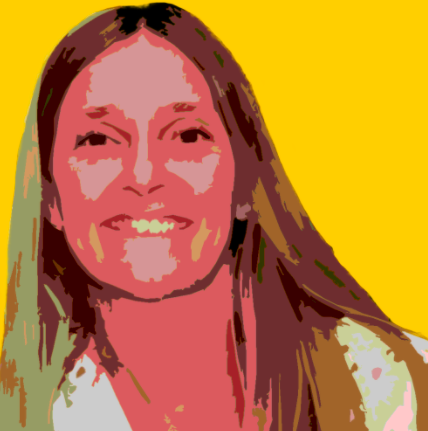Victoria is an early riser. Her morning starts at 6 am with a light, healthy breakfast, french style. Toast, fruits, some yoghurt. Her engine is made of lightness and endurance. She reminds me of the Duracell bunny advertisement from the nineties. After a while, all but one battery bunny quits their movement. There is only one that goes on and on and on. That’s Victoria. Ambitious, focused, dedicated, wise, very hard working and beloved by all colleagues. I recruited her ten years ago, and ever since she has given her ‘all’ to Solidaridad. That is admirable, as she also runs her family with three young daughters and her husband in suburban Buenos Aires.
Victoria is well suited for global work. “I consider myself a world citizen,” she says, having been born in an Argentine family in Switzerland, later moving to France, India, and London where she met her Argentine husband and finally landed in Buenos Aires. “I often wonder: what am I doing in this country, beautiful as it is, but so chaotic. In stark contrast with my organized brain!”
But will Buenos Aires be the last stop for this globe trotter? “That’s a permanent discussion at home,” she says. “If I see the multi-colourful world, it’s such a stark contrast with the very homogeneous ethnic and cultural population of Argentina. I sometimes wish my girls could experience the intriguing diversity of our planet. I feel lucky and am proud to be able to build my career through this wonderful job.”
Bringing out the diversity and unique perspective in each story, while understanding larger trends in data, is what drives Victoria’s curiosity in her work. “The essence of my work is to understand the story behind the data we collect. The story of farmers, workers, and also miners in the poorer regions of the world.” Her work has taken her to “remote places in the Amazon, in Maya villages in Guatemala, in gold mining regions in Tanzania” and has allowed her to engage in deep conversation and learning “with cocoa smallholder farmers in Ghana, in Namibia with cattle rangers, in various places in India, Bangladesh, Indonesia.” But telling this story is not just interesting, it is crucial to build the evidence that sustainability pays off. “I wish my daughters could see and witness what I experience myself. It is a privilege, in many ways.”
Victoria speaks passionately about her five years’ target. On how data can help farmers to improve their performances, their business case. On how data can help to show the business case of sustainability. On how good data can help the farmers’ intuition to ensure rational decisions can be taken.
As a sociologist by training, one might expect Victoria’s world to revolve around surveys and quantitative statistics, but that isn’t quite it. “I feel more like a modernist anthropologist nowadays. Matching granular data to give meaning. To ensure we can tell the story behind the data.” Understanding the experiences, growth, and goals of smallholder farmers isn’t easily tied down to numbers. Through her work, she knows just how nuanced development is. “We cannot capture the lifetime story of an individual female coffee farmer entrepreneur deep down in Ethiopia in something simple as a standardized living income number. Wellbeing is difficult to be measured but is after all the essence of our work.”
And that commitment to telling real, genuine stories, and understanding and measuring impact, is what gives Victoria energy each day.
Showing the business case of sustainability is about bringing hard data together with individual stories. And that’s where we as Solidaridad want to be.
Victoria Graham
In the podcast, you can hear in detail Victoria’s stories on Namibia, on attribution versus contribution, on our lean data methodology and much more.

